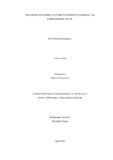
Please use this identifier to cite or link to this item:
https://hdl.handle.net/20.500.14301/305| Title: | INFLUENCE OF SCHOOL CULTURE IN STUDENT'S LEARNING: AN ETHNOGRAPHY STUDY |
| Authors: | Karmacharya, Ravi Kiran |
| Citation: | Karmacharya,R.K.(2023).Influence of School Culture in Student's Learning: An Ethnography Study. |
| Issue Date: | Apr-2023 |
| Publisher: | Kathmandu University School of Education |
| School: | SOED |
| Department: | DOEL |
| Level: | M.Phil. |
| Program: | M.Ed. in Leadership and Management (Two Year Program) |
| Abstract: | Each school is deemed to have its own unique cultural identity; as a result, no two schools are alike. Every school differs due to differences in cultural characteristics. Every school creates and promotes a unique cultural environment; therefore, it can vary immensely from school to school. The school culture may comprise school norms, values, discipline‘ the complete landscape of the school, artifacts, the behavior of teachers and students, the administration system, the language used within the premises of the school, co-curricular and extracurricular activities, celebrations of various feasts and festivals, school day and Parents‘ Day celebrations (Peterson, 2002). The students' learning activities from the school grade to the university grade largely depend upon the practice of the school culture. As culture is an acquired phenomenon in any institution, school culture is the existing Act of acquired knowledge, norms, values, discipline, and system behavior followed by the teachers and students as the tradition of a school. The students need proper learning support from the principal, teachers, staff, and school friends. They required adequate communication, relation, and connectedness with their teachers and principal for sound learning. To explore these contexts, I chose the interpretive paradigm. I adopted ethnography as a research method to generate information from the participants about their experiences of school culture in public schools. The students from grade twelve were the research participants. I observed the school culture practices, i.e., teachers' and students' communication, teachers' and students' relation and connectedness, and the role of the principal. In addition, I also interviewed students, teachers, and staff in the library and canteen and took field notes to generate information. The information recorded during the observation was transcribed and coded to create themes in meaning-making and analysis. The themes were eventually interpreted and discussed in line relating to the invitational and constructivist learning theories. The students revealed that the traditional method of teaching and evaluating system in the school (evaluating only through written examination) should be revised. The participants also explored that the principal required being more active. They needed to make frequent visits and supervision to improve the quality of education and to fulfil the requirements of the students in education. Teachers are required to adopt modern style teaching techniques, such as using the projector. The students learn more from the practical activities than the learning inside the four walls of the classroom. The students must also be motivated, understood, valued, and trusted. The school must focus on proper discipline to maintain positive school culture. Positive school culture plays a vital role in the student's learning process, which further helps satisfy them. Students' engagement in the classroom was exciting while using the projector and letting them express their ideas regarding the related subject matters. The students were also found to be regular and disciplined while treated friendly. Students share their feelings and learn better if teachers make good connections and relationships with them. Extracurricular activities, field visits, proper caring and communication, and good relations with the students result in a better outcome. The study outcomes are expected to contribute to policymaking and reviewing the policies for students in grades eleven and twelve in the school in Nepal. Besides, they may contribute to how teachers, students, and authority collaborate to develop skills in both teaching and learning as positive school culture. Furthermore, the study is expected to make a difference in pedagogical practices in educating students. |
| URI: | https://hdl.handle.net/20.500.14301/305 |
| Appears in Collections: | Dissertation |
Files in This Item:
| File | Description | Size | Format | |
|---|---|---|---|---|
| Ravi Kiran Karmahrya.pdf | 1.36 MB | Adobe PDF |  View/Open |
Items in DSpace are protected by copyright, with all rights reserved, unless otherwise indicated.